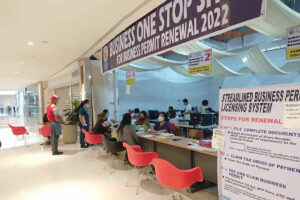A PROPOSED e-governance bill is expected to address the blind spots of the government’s current digitalization effort in curbing corruption, analysts said.
“E-governance can only be successful if government makes a commitment to use e-governance tools to ensure efficient, transparent and accountable public services,” Terry L. Ridon, a public investment analyst and convenor of think tank InfraWatch PH, said via e-mail.
Mr. Ridon said that the current state of digitized government has not yet clamped down on corrupt practices and inefficient services.
“We are mindful of the failure of (the current set-up of) e-governance in several agencies in preventing corrupt practices, such as in the Bureau of Customs in which organized smuggling continues to persist despite the institution of mandated digitization mechanisms,” Mr. Ridon said.
He also said that expanding e-governance “should help stop current concerns relating to the offloading of Filipino travelers due to unreasonable delays in the passport control process,” referring to an incident at the Ninoy Aquino International Airport in which a passenger missed a flight due to an immigration officer’s excessive questions.
Digitizing government documents should “limit the intervention of fixers and middlemen,” Sherwin E. Ona, a political science and development studies professor at De La Salle University, said in a Viber chat.
“Well-designed online services can result in faster turnaround time for transactions, and fewer opportunities for corruption due to the transparent nature of information and communications technology services,” he said.
The bill cleared third reading at the House on March 6. Its counterpart measure in the Senate is currently at the committee level.
House Bill No. 7327 tasks the Department of Information and Communications Technology (DICT) with creating an E-Government Master Plan.
The measure also proposes to create the Philippine Infostructure Management Corp., a government-owned and -controlled corporation under the DICT to implement infrastructure programs like the National Broadband Plan, the Free Wi-Fi for All, and the expansion of the National Government Data Centers and Government Cloud.
If passed into law, the digitization of a paper-based documents and information is expected to “encourage government cooperation with the private sector in providing resources, assets, and services,” Information and Communications Technology committee chairman and Navotas City Rep. Tobias M. Tiangco said during plenary deliberations on the bill.
According to Mr. Ridon, E-governance serves as an “institutional check” in the procurement process (at) all levels of government, ensuring that public officials cannot interfere during the course of public bidding as soon as terms of reference and bidding documents are issued.
He added that government itself is the “ultimate roadblock” in ensuring efficiency and transparency through e-governance “if it fails to rein in malevolent actors in public service who might reject implementing e-governance tools for illicit ends.”
Deputy Minority Leader and ACT Teachers’ Party-list Rep. France L. Castro, one of the legislators who voted against the bill, said e-governance may increase state surveillance of the public and place citizens who lack digital access at a disadvantage.
“It will widen and worsen the digital divide among Filipinos,” Ms. Castro said during a March briefing.
To address this, Mr. Ona said that the measure must guarantee the protection of personal data through serious implementation of the data privacy law and cybersecurity protocols.
“The usual approach is infrastructure driven. This should not be the case for e-governance (as) it must be sensitive to the critical needs of its citizens,” he said. — Beatriz Marie D. Cruz
